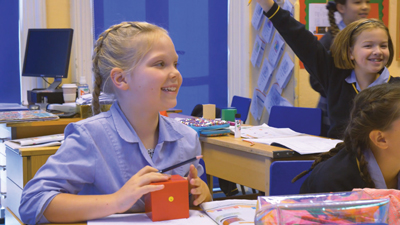
by Rebecca Branton
Burgess Hill Girls Pre-Prep and Prep School teacher
There is plenty of research to support the benefits of learning a foreign language as early as possible. Studies by Harvard University, for example, suggest that the creativity and flexibility of the mind are enhanced when young children are exposed to a range of ways of communicating, including through two or more languages. Some academics suggest exposing children to other languages as early as their preschool years, as this is when the child is establishing patterns for thinking and learning.
Young children enjoy learning. They are keen to jump in and have a good time whatever the activity and can pick up a lot through nursery rhymes, silly songs, games, and puppets. The brains of the very young are used to developing new means of expression. They learn new words every day and benefit from exposure to broad, extensive vocabulary in their native tongue as well as new words and expression in other tongues. Concerns about children not having the ‘bandwidth’ to pick up two or more languages appear to be misplaced – it seems that the wider the experience the better in this area.
The Harvard study compared the verbal and written test results of pupils who had learned a foreign language and those who had not. They concluded that the foreign language-learning cohort had not just superior linguistic skills but also better cognitive skills altogether.
Children who learn a language when they are very young have a much better chance of not having a foreign accent. The younger the learner, the better they are at mimicking new sounds and adopting pronunciation. The brain is most open to new sounds and patterns in pre-adolescence.
Young children are undaunted learners. They are not yet self-conscious and are happy to try out their newly acquired language skills without fear of embarrassment. They are eager to see what response they will get when they try out new words and vocabulary because they are programmed to delight in communicating. Parents of teenagers know that unfortunately this does not last! So, schools must make the most of the window of uninhibited learning opportunity.
Teaching a modern foreign language to a young child catches their enquiring mind and satisfies their natural thirst for new experiences as well as their curiosity about language itself. It exposes them inevitably to other cultures and therefore inoculates against insularity and intolerance. Most of all, they enjoy it, if the teaching is crafted to appeal to their sense of fun and relates to their interests.
It is therefore my privilege to teach KS1 foreign languages at Burgess Hill Girls Pre-Prep and Prep School. We are fortunate to be able to offer a foreign language from Year 1 and offer enrichment opportunities such as special French Days and after-school clubs.
To find out more about Burgess Hill Girls visit www.burgesshillgirls.com











